2024 begins a new four-year Local Law 152 gas inspection cycle in New York City. A lot can change in four years. If you are a new building owner, this may be the first time you have dealt with the LL152 gas inspections at your properties. At HBNY Plumbing & Heating, we specialize in helping residents and building owners through this process. Following our 2024 guide will prevent penalties and ensure you comply with the law.
Examining exposed gas piping is critical to maintaining public safety. While tenants are likely to report issues with gas lines and piping inside their residences or shops, they may not notice problems with exposed piping in public areas. A regular inspection can discover issues before they become dangerous.
Understanding Local Law 152
New York City passed Local Law 152 in 2016 in response to public safety concerns caused by the improper installation and neglect of natural gas piping. The legislation took a few years to reach its final form, and the first cycle of inspections began in 2020. Every four years, most buildings in the city must schedule an appointment where a trained and certified inspector will check exposed gas piping for issues such as:
- Improper use of flex hose
- Evidence of illegal connections/non-code compliant installations
- Gas leaks
- Worn part(s) affecting safe and reliable operation
- Other unsafe condition(s)
If the inspector finds an issue with a building’s gas piping, the building owner must resolve it. Hazardous conditions require immediate attention. In other cases, the building owner must arrange for the repair and submit a certificate signed and sealed by an N.Y.C. Licensed Master Plumber within 120 days of the initial inspection indicating the resolution of the problem. If more time is needed an extension up to 180 days from the date of the initial inspection can be requested by the plumber.
Requirements for LL152 Gas Inspections
Who Needs to Comply with Local Law 152?
Many buildings in New York City are required to have a gas piping inspection based on their occupancy classification. The law does not apply to one- and two-family homes in the city as well as other buildings in the R-3 occupancy group.
If you are uncertain about your occupancy classification, you will find it on your building’s Certificate of Occupancy. You can use the Department of Buildings (DOB) Building Information System (BIS) to look up this data by address. If you are still uncertain, contact our office, and we can help determine if an inspection is necessary for your property.
What are the 2024 Districts Due for Inspection?
New York City is famous for its five boroughs. For reference purposes, each borough is broken into several districts. In determining the LL152 cycle schedule, the DOB has inspections in a few districts in every borough each year. For 2024, buildings in Community Districts 1, 3, and 10 in all five boroughs are due for inspection. The DOB BIS can help if you are unsure of your district.
If you own more than one property in NYC, it is important to note that you should only seek LL152 gas inspections for buildings located in the appointed districts. Inspectors will not inspect buildings in an off-year district.
Who Can Perform LL152 Gas Inspections?
LL152 inspections happen under the oversight of an N.Y.C. Licensed Master Plumber. The LMP may perform your inspection or might have a certified inspector handle the site visit. However, no matter who carries out the inspection, the DOB paperwork must be signed and submitted by an LMP. If the inspection uncovers any underlying problems, an LMP must reinspect and submit a report declaring all conditions requiring corrections have been corrected.
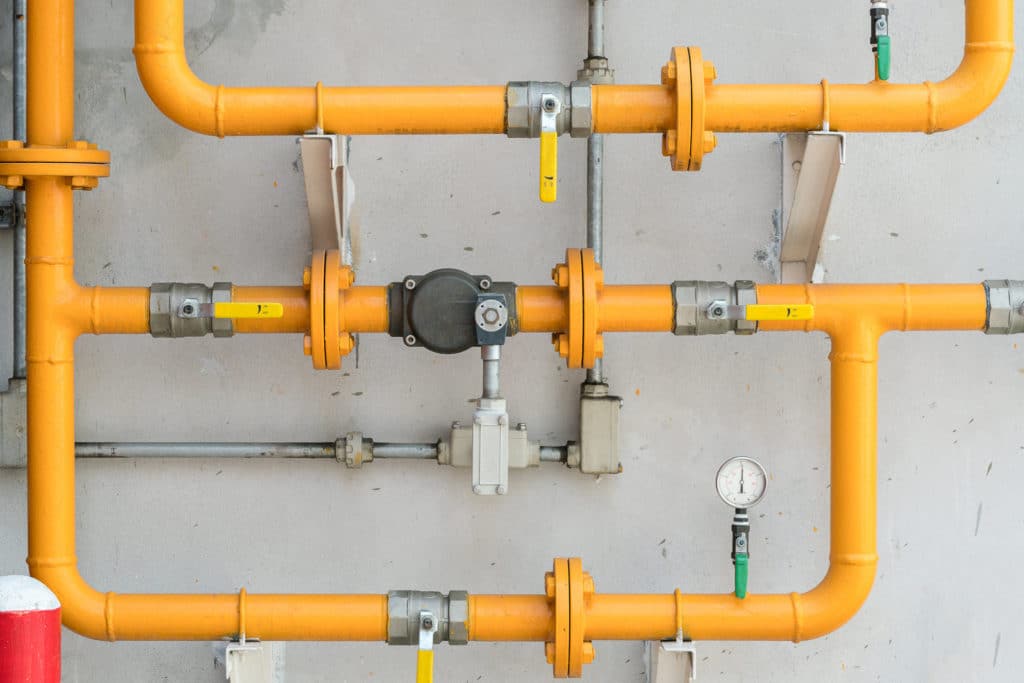
The Inspection Process
LL152 Inspection Steps
The LL152 is a relatively easy process, as the LMP hired for the task handles much of the work. Here is a general breakdown of the procedure:
- Determine Your Inspection Requirement: First, building owners must determine if their building is subject to LL152. This step involves checking the building’s classification and understanding which community district it falls under.
- Hire an N.Y.C. Licensed Master Plumber (LMP): Once you know an inspection is required, the next step is to hire an N.Y.C. Licensed Master Plumber. The LMP or a certified individual working under them will conduct the inspection.
- Conducting the Inspection: The LMP will inspect the exposed gas piping system within the building. This task includes checking for leaks, corrosion, and illegal installations, and ensuring the system meets current safety standards.
- Addressing Hazardous Conditions: If the inspection reveals any unsafe conditions, immediate action is required. The LMP must notify the building owner, the utility company, and the Department of Buildings (DOB). Necessary repairs must be undertaken in compliance with NYC Construction Codes.
- Reporting and Documentation: After the inspection, the LMP must provide the building owner with a Gas Piping System Periodic Inspection Report (GPS1) within 30 days. This report details the findings of the inspection.
- Certification Submission: Within 60 days of the inspection, the building owner must submit a Gas Piping System Periodic Inspection Certification (GPS2) to the DOB. This certification, signed and sealed by the LMP, confirms the inspection.
- Follow-up for Repairs: If repairs were needed, a subsequent certification stating that the conditions have been corrected must be submitted within 120 days of the initial inspection. In cases where additional time is needed, the LMP can extend the time limit to 180 days.
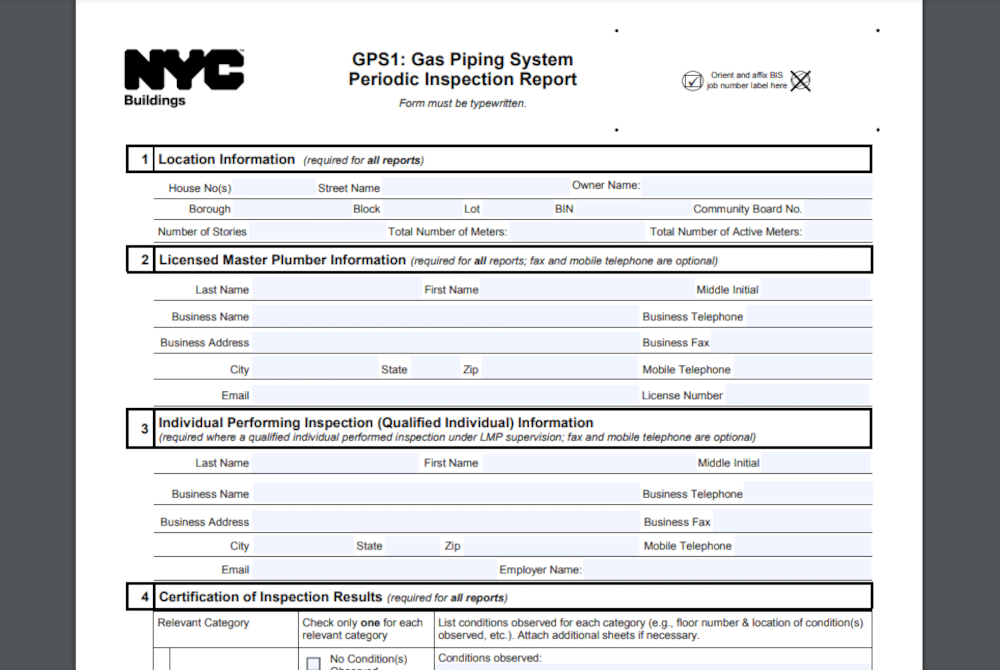
Documentation and Certification Requirements
Building owners will deal with two documents as part of the inspection. The GPS1 form shares the findings of the inspection such as illegal connections, corrosion, and worn parts. In the best-case scenario, the inspector will find no issues, and the building owner or LMP can file the second document, the GPS2:Gas Piping Periodic Inspection Certification, with the DOB, fulfilling the requirement for that 4-year cycle.
However, as a building ages, the gas piping will need repairs at some point. The LMP or building owner must submit the GPS2 to the DOB regardless of the status of the piping. Once any repairs are complete, another GPS2 signed and sealed by an LMP must be filed indicating the correction.
Preparing for LL152 Gas Inspections
LL152 mandates a visual inspection and leak survey of the exposed gas piping in your building from the point of entry including public spaces, hallways, mechanical rooms, and service meters. The primary way to streamline the inspection process is to ensure the inspector has easy access to all these areas. Because the inspection does not involve accessing tenant residences, you do not need to coordinate the appointment with them.
Potential Penalties for Noncompliance
Ignoring LL152 requirements can have serious consequences for building owners. On a practical level, missing problems with gas piping when they are minor may result in expensive emergency repairs and gas shutoffs in the future. Neglected gas piping is a safety concern for your building and its occupants, and a regular inspection may prevent tragic consequences.
LL152 legislation includes a financial consequence for building owners who fail to schedule an inspection. The DOB can assess a $5,000 civil penalty for failure to file an inspection certificate on time.
Resolving Issues
What happens if the inspector finds a problem?
Every system in your building will require attention as it ages, and gas piping is no different. At some point, your LL152 inspection report will indicate that something in the system needs repair. According to the legislation, a few things must happen at this point.
- You must submit the GPS2 form indicating repair is required. This step allows the DOB to identify safety hazards in the city.
- If there is a hazardous condition, the inspector will notify you, the DOB, and the utility company. Dangerous conditions must be handled as soon as possible.
- For other repairs, you will have 120 from the inspection to file a new certificate signed and sealed by an LMP indicating the conditions have been resolved.
What if I need extensive repairs?
It may not be reasonable to expect major overhauls of your gas piping to be complete in 120 days. The LMP who fills out your GPS2 can indicate that the repairs will require more time. In this case, the DOB will give you 180 days from the initial inspection to complete the repairs.
Special Cases and Exceptions
Occupancy Group R-3
The most common exceptions to LL152 gas inspections are single and two-family homes that fall under the R-3 occupancy group. Other buildings in this category include dormitories, convents, monasteries, and other nontransient living quarters with 16 or fewer occupants.
Buildings Without Gas Piping
A few buildings in NYC do not have gas piping systems. They will not require an LL152 inspection, but they must provide a GPS2 signed and sealed by either a Registered Design Professional or an LMP indicating that no gas piping is present.
Buildings Without Gas Service
Some buildings in NYC may have gas piping installed but are not currently supplied with gas. In this case, the building owner must submit a signed statement from the utility company with the last date it supplied gas and the date the service ended. The building owner must certify that the building no longer receives gas service and its appliances are not connected to the gas piping system. An inspection will be required if the building resumes gas service in the future.
New Buildings
The inspections required for occupancy mean that new buildings will not go into the LL152 cycle immediately. However, after 10 years, they must receive an inspection. Then, they will become part of the normal four-year cycle.
Resources and Assistance
Resources and Assistance
The NYC DOB wants to keep buildings safe in the city. If you have questions about the legislation or your inspection, they provide several online resources to help you:
- LL152 Legislation
- LL152 FAQs
- Periodic Gas Piping System Inspections for Building Owners
- DOB Building Information System
- LL152 Online Portal
As a certified LL152 inspection provider, HBNY Plumbing & Heating is also happy to help you through the 2024 inspection process. We encourage you to contact us with your questions and schedule your inspection before the demand increases at the end of the year. Our goal is to keep your LL152 inspection as straightforward as possible.

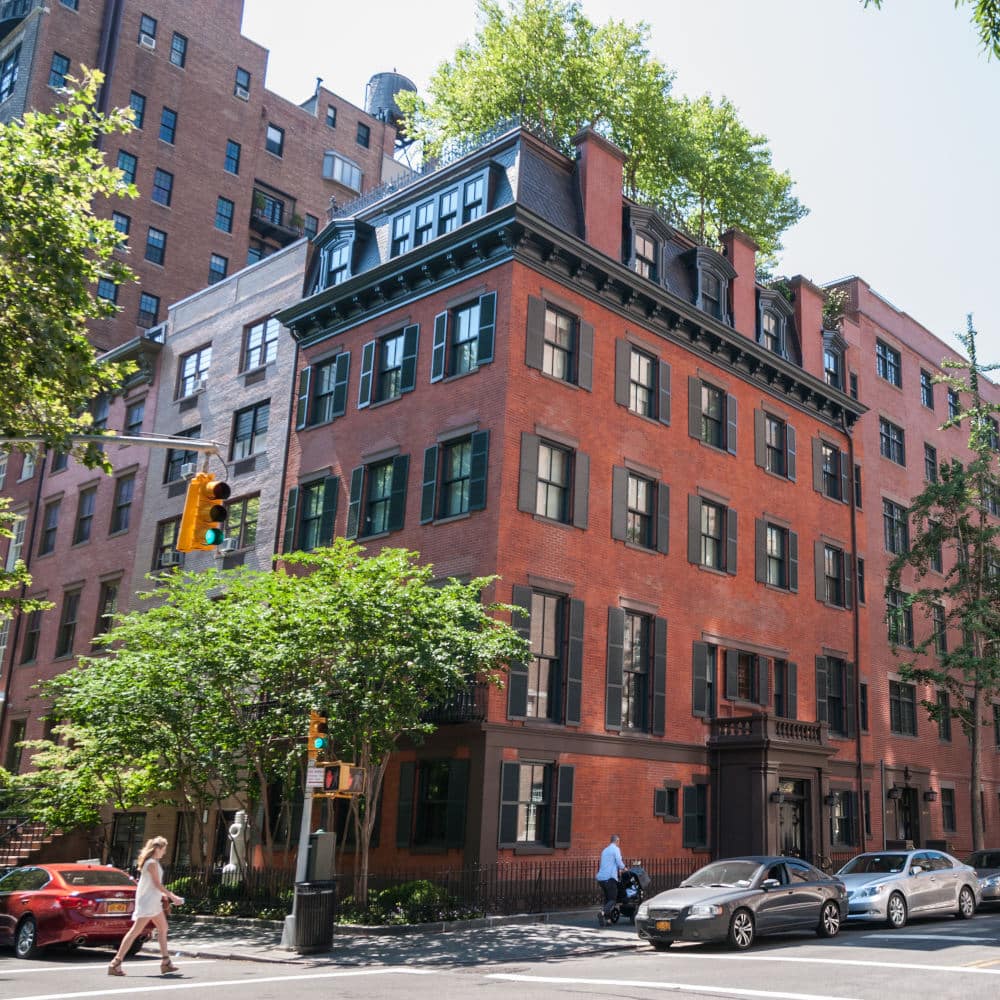
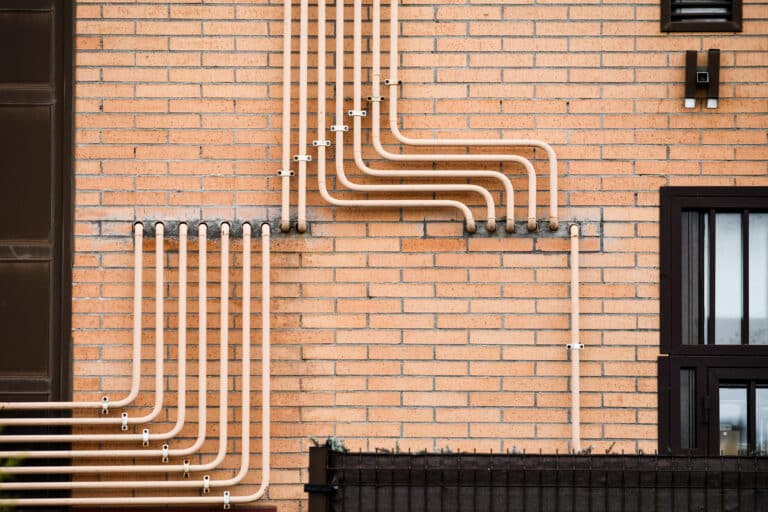
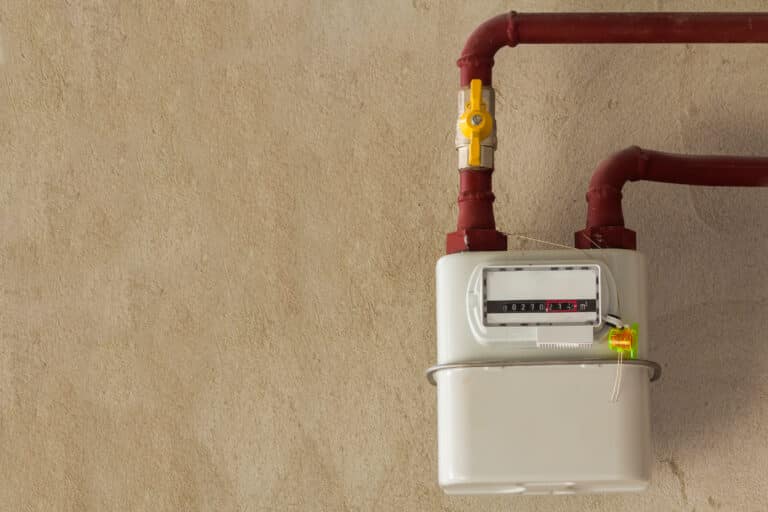
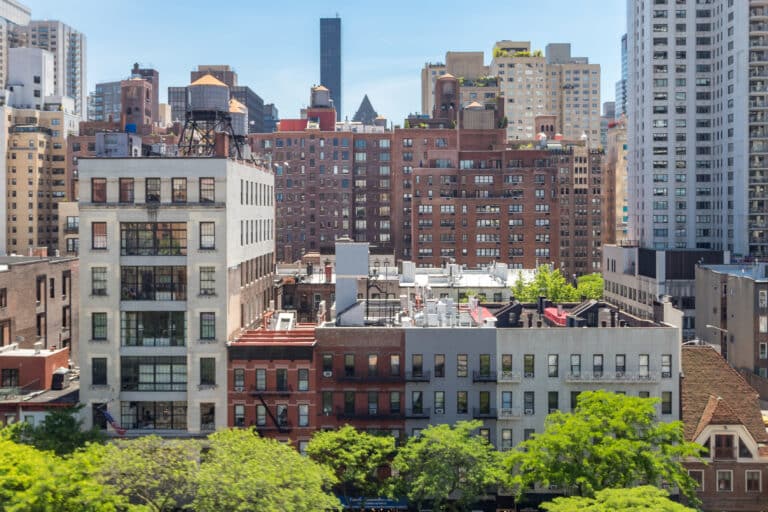

One Response
LL152 inspection